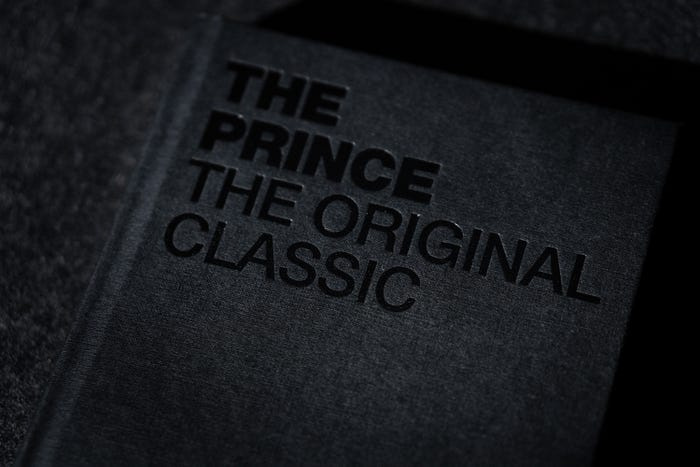A Woman’s Insult At A Bar Turned Out To Be Great Life Advice
Thoughts on perception from Machiavelli, the world’s greatest negotiator, criminals, and a stranger with a beer

“You really shouldn’t wear that.”
The words almost woke me up from a trance. I’d been trying to get a bartender’s attention who was painfully busy with no success. My head turned to the sound of the voice. It took a few seconds for me to put the words together in my head because they came out of nowhere.
“Huh?” I replied over my shoulder. I turned to see a woman standing behind me. I was in my early twenties at the time. She had to be in her mid-thirties. She repeated it again nonchalantly, “You really shouldn’t wear that shirt.”
I looked down at my shirt. I didn’t see any marks on it, the material was clean, and no holes either. I was stumped. “Why not,” I asked.
“It makes you look low class, and you don’t look like that type.” She pointed out the shirt was sleeveless, and it gave off two images: dopey gym guy or hood rat. Neither caught her as appealing.
I don’t remember much else of the conversation, except it was genial. She wasn’t mean. I don’t remember getting angry either, just a few minutes of conversation, which ended when the beer arrived.
My friends busted my stones because a random woman at the bar took it upon herself to approach me and insult my clothing. And I left it at that.
Until years later I realized this stranger taught me a valuable lesson. It focused on perception — particularly how those in the world perceive you. What’s more, it wasn’t only her lesson. Some of the world’s greatest minds and worst criminals also teach a very similar lesson.
Niccolo Machiavelli, the famous political writer, was a firm believer in the power of perception
The “World’s Greatest Negotiator” Herb Cohen used perception as a tool to open incredible doors
Criminals are naturals for sizing people up as targets by perception
My barroom instructor had taught me a truly complex lesson in simple language, which I totally missed. But it’ll be more apparent after we take a field trip. Our first stop is New York about sixty years ago.
People See You As You Portray Yourself
“Power is based on perception. If you think you got it, you got it, even if you don’t got it.”
— Herb Cohen, The Adventures of Herbie Cohen by Rich Cohen
Rich Cohen could tell you his dad Herb looked ordinary but was far from that. He grew up the son of a professional negotiator. For your information, that profession didn’t exist until Herb Cohen created it himself. In his book, Rich gives a quick summary of feats his dad was involved in.
He wrote a book called You Can Negotiate Anything, which sold over a million copies
Herb successfully negotiated both the Baseball Umpire Strike and New Orleans Police Strike in 1979 and the NFL player’s strike in 1986
He advised both Jimmy Carter with the Iran Hostage Crisis and Ronald Regan in his negotiations with Mikhail Gorbachev
Herb helped the US and Soviet Union negotiate a strategic arms reduction agreement in Geneva
Herb had an innate gift for noticing things most people ignore — perception being one of the biggest. He first demonstrated its power at nine years old on a street corner in New York to a friend named Larry Ziegler (Larry King).
The boys as usual were in trouble at school. The sentence for their crimes: to be crossing guards on a street that didn’t need one. Larry complained about it, seeing it as busy work to keep them out of trouble. However, Herbie had another idea.
“They’ve given us power,” Herb proudly proclaimed, pointing at the orange “safety” belts they wore across their chests. Then, he proved his point. He stepped out into a busy street, raised his hand, and stopped traffic for a full five minutes in the middle of New York.
People screamed, almost got into fights, and horns blew but no one challenged Herb’s authority — the authority of a nine-year-old, with a dinky orange belt. The traffic blockade only ended when a teacher grabbed the kids.
His lesson: people see you as you portray yourself. Strangely, Niccolo Machiavelli saw things much the same way and had his own opinions about perception. This takes us to our next stop, Italy in 1513.
Appearances Are As Important As Reality

“Men judge more by appearances than by deeds…Everybody can see what you seem to be; few can judge what you actually are.”
— Niccolo Machiavelli, The Prince
Some consider Machiavelli evil; however, he was more on the pragmatic end. He had to be. The writer lived in a fractured Italy which was broken into pieces and vulnerable to the European wolves surrounding them.
In his work The Prince, he lays out a way for a ruler of his day to unite Italy and protect it from invading armies. Perception is a big part. He notes that he who is always good “often wrecks himself among those who are not.”
While reality doesn’t allow you to be an angel all the time, it’s good to have the appearance of one. According to Machiavelli:
“A Prince needs to take care never to let escape from his lips anything contrary to these five qualities, seeming always to be compassionate, faithful, honest, humane, and religious.”
Now, substitute “A Prince” with your name, and it becomes valuable life guidance. Basically, you can mold others’ perception of yourself with posturing. It takes Cohen’s advice out of our own head, bending other’s vision using light we generate ourselves.
Since Machiavelli has steered us toward a darker side, we’ll continue our trip. Next stop: a modern-day prison.
Perception And The Criminal Mind
“Perpetrators notice a person whose walk lacks organized movement and flowing motion. Criminals view such people as less self-confident — perhaps because their walk suggests they are less athletic and fit — and are much more likely to exploit them…Just like predators in the wild, armed robbers often attack the slowest in the herd.”
— Psychology Today, Chuck Hustmyre and Jay Dixit
In their article above, Hustmyre and Dixit reference a classic study done with a set of prisoners convicted of every crime imaginable. The group was shown videos of people walking. Then, asked who they would most likely target.
To the researcher’s surprise, the convicts all picked the same targets. The choice had nothing to do with age, race, or sex. Size didn’t even matter.
Body posture, gait of walk, and attention were the main indicators.
The criminals noticed these traits instinctively. Spending over twenty years in martial arts, I sadly realize these are things the victims of these creeps could have controlled.
Even standing up straight with their shoulders back or looking aware could have been enough of a cue to send the “look somewhere else” signal.
But Cohen and Machiavelli would have told you something similar. Likely the blunt woman at the bar too. Speaking about her, that would be a good place to end our field trip.
The Insult That Wasn’t
In my twenties, I saw this older woman’s comment as an insult (although an amusing one.) But it wasn’t. She was over ten years older with life experience and went out of her way to share it.
The words weren’t obnoxious. She spoke to me like she might to a younger brother in the process of making a bad decision. Moreover, her advice was good.
I noticed when I went out dressed like that, the wrong type of attention found me. Namely, people wanting to fight or other two-legged versions of trouble.
As I got more mature — like Cohen pointed out —self-confidence could be generated with thought and action, not clothing. If I thought I had it, I did.
Likewise, I could also adjust other’s perception in how they saw me. Not to conquer an empire but influence a business deal or make a sparring partner move a certain way.
Finally, as a certain bar philosopher suggested, I changed up my clothing a bit. She was right. It sent a signal to myself and those around me, like that Brooklyn kid’s orange belt.
Although her words were simpler than Cohen’s or Machiavelli’s, they flew over my head until years later.
The lesson: everything from the gait of your stride, the clothes you wear, and words you use affect perception. Use it to your advantage.
-Originally posted on Medium 8/6/22


